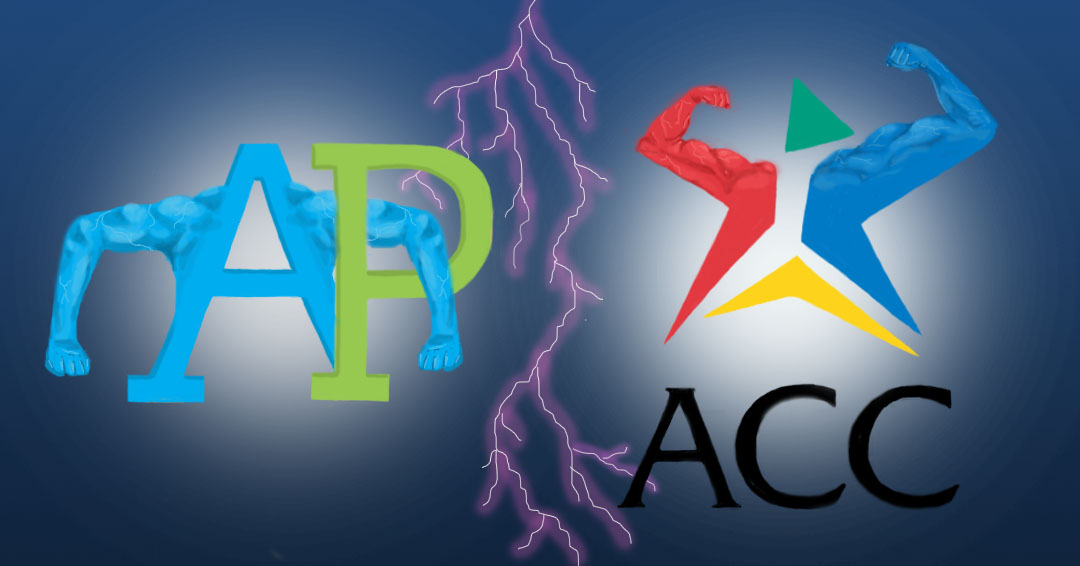AP vs ACC: Who Will Win?
Student Opinions Go Head to Head
September 20, 2019
Life after high school varies for just about everyone. However, college prep classes offered at the high school begin and end at Advanced Placement (AP) and Austin Community College (ACC) dual credit. The real question is: which is inherently superior to the other?
AP
AP classes are offered across the country and also provide the possibility for college credit if earned through a course relevant AP test in the spring. Depending on the course, these classes are available for all grade levels and provide opportunities for students to attempt more challenging course material.
Senior Alex Meub, who has embraced the challenge of five AP classes this year, believes the risk of failing the AP test should not deter students from giving it a try.
“If worse comes to worst, maybe you don’t get the college credit but at least you tried [the class] and still got the high school credit,” Meub said. “It’s always good to push yourself and see if you can handle it.”
Additionally, signup for AP classes is as simple as checking a box on the course selection sheet, whereas enrolling in ACC classes requires more effort from the initial application to the registration process.
In regards to the challenging curriculum of many AP classes, Meub says it’s all a matter of commitment to learning and developing appropriate study skills
“I think some students don’t learn how to take notes properly,” Meub said. “[They] don’t realize how much of a time commitment reading the textbook actually is.”
Senior Marlee Randel, who takes AP classes during the school year in addition to summer ACC courses, agrees with Meub’s view.
“The workload of AP classes is more significant,” Randel said. “And the content is more rigorous than it is in ACC classes.”
Sincerity for learning and being surrounded by focused peers, as well as trying to find interest in the material are sources of motivation Meub feels is needed to achieve academically. She concluded that success in AP is fairly simple.
“With any class, if you don’t do the assignments or don’t do any practice, obviously you don’t learn anything and so you struggle more,” Meub said. “Just keeping up with the [textbook] readings, and paying attention in class just like any other class helps a lot to keep you going.”
One of Meub’s favorite aspects of AP is the atmosphere of the classes and the ease with which she feels connected to teachers.
“I could ask the teacher any questions I want whenever I wanted,” Meub said. “[In contrast to ACC] I don’t have to wait for office hours or whenever a teacher is specifically available.”
On the other hand, students like Randel enjoy AP classes for some of their social aspects.
“There is a strong sense of community in AP classes,” Randel said. “It’s challenging, but bonding [with classmates] over a little bit of shared suffering makes it all worth it.”
ACC
Cedar Park High School’s dual credit program with ACC can guarantee nearly 30 hours of college credit upon completion after two years. With registration available as early as the summer of junior year, students have the possibility of completing a bachelor’s degree in just three years outside of high school.
Senior Emilee Kitzmann, a dual credit student for two years, says this promise of college credit is what drew her to the program in the first place. While the cohort structure, which guides ACC students to take specific classes, differs from AP courses in students’ ability to choose which specific classes they are interested in, it ensures both high school and college credit, and only requires a passing grade in the class. AP tests, however, evaluate students’ performance in class regardless of grade.
“With ACC, credit is guaranteed because you’re taking actual college classes, not just the equivalent of them,” Kitzmann said. “The grind of [AP courses] wouldn’t be worth anything outside of high school if you didn’t pass the AP tests.”
As for ACC course material, Kitzmann is no stranger to the in-depth curriculum but ultimately believes the challenge is worth the benefits that dual credit provides.
“The workload is college-level [and] the material you get is the same as what people who have already graduated [from high school] are getting,” Kitzmann said. “You have to consider the long term benefits and not just what feels comfortable in the moment. You can either get through [the classes] now and get free college credit, or you can do it later and have to pay for it yourself.”
Another perk of ACC is the option to enroll in distance learning summer courses operating exclusively online. Students can knock out courses that they would otherwise be required to take during the school year, as Senior Marlee Randel has done with her English classes for the past two years.
“The time I gained by taking English online allowed me to create more variety in my schedule during the year,” Randel said. “And it was honestly nice to keep my brain engaged over summer break.”
Contrary to the beliefs of some students, a majority of ACC classes offered at the high school transfer to universities all over the country, not just universities exclusive to Texas. And with a smaller student to teacher ratio, students can expect different classroom dynamics with their professors. Kitzmann embraced these differences of ACC from high school both in the curriculum and in the classroom.
“Professors don’t look down on you like you’re a kid, they may openly curse during lecture or teach in a non-traditional way, and they’re perfectly allowed to,” Kitzmann said. “The classes are harder, but if you care about getting the work done, the payoff is great.”

